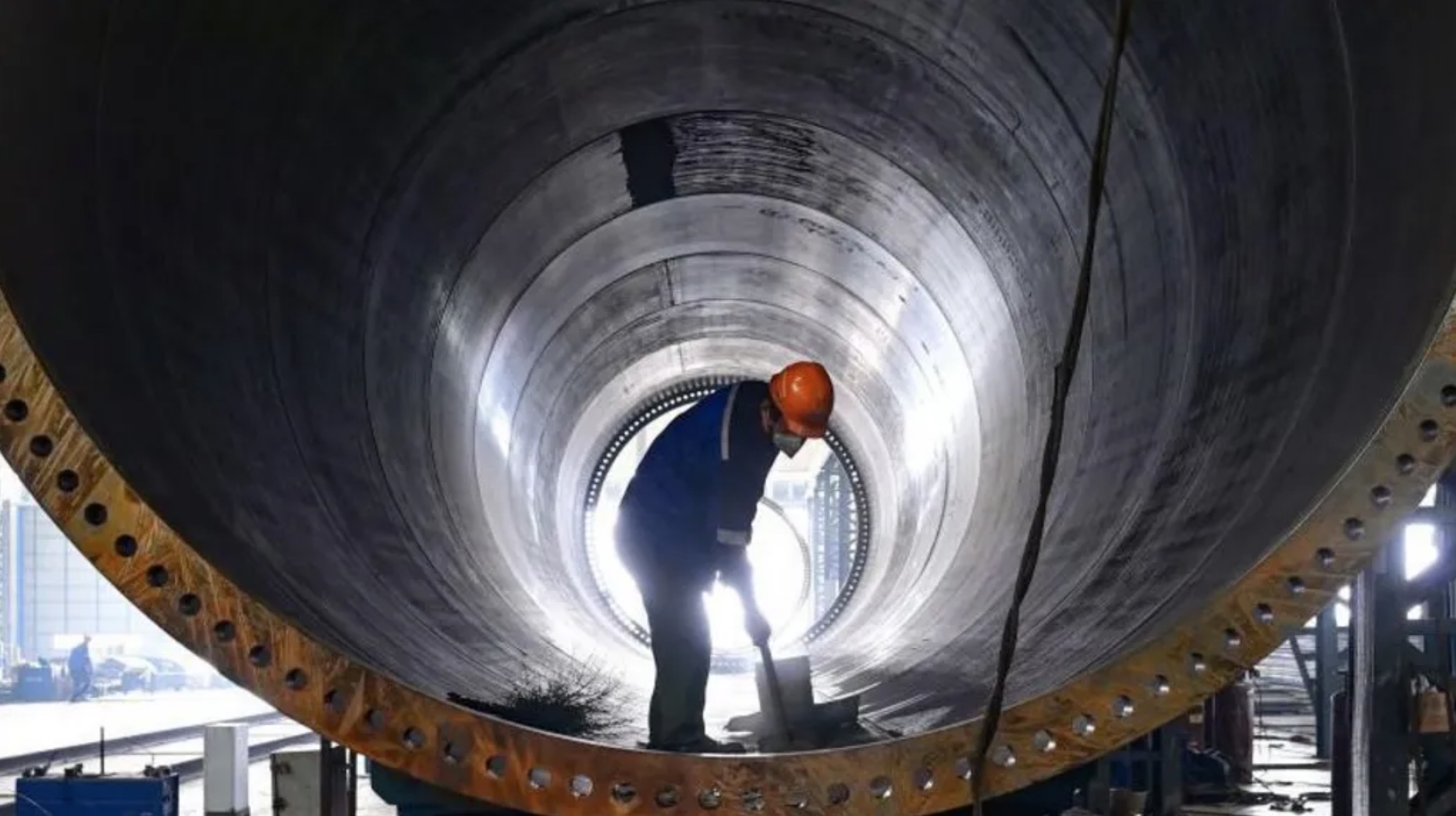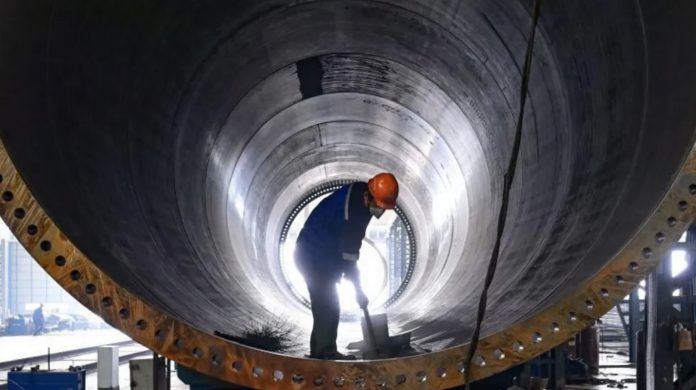เศรษฐกิจจีนเติบโตในอัตราที่ช้าที่สุดนับตั้งแต่ต้นปีที่แล้วในช่วงสามเดือนจนถึงสิ้นเดือนกันยายน ท่ามกลางความพยายามของประเทศในการกระตุ้นการเติบโตที่ตกต่ำ ผลิตภัณฑ์มวลรวมภายในประเทศ (GDP) ขยายตัว 4.6% เมื่อเทียบเป็นรายปี ต่ำกว่าเป้าหมายประจำปีของรัฐบาลที่ “ประมาณ 5%” ตามรายงานของสำนักงานสถิติแห่งชาติจีน
อย่างไรก็ตาม ตัวเลขนี้ดีกว่าที่นักวิเคราะห์คาดไว้เล็กน้อย ขณะที่ตัวเลขอย่างเป็นทางการอื่น ๆ ที่เผยแพร่เมื่อวันศุกร์ เช่น ยอดค้าปลีกและผลผลิตภาคโรงงาน ก็เกินกว่าที่คาดการณ์ไว้เช่นกัน
ในช่วงไม่กี่สัปดาห์ที่ผ่านมา รัฐบาลปักกิ่งได้ประกาศมาตรการหลายอย่างเพื่อสนับสนุนการเติบโต นี่เป็นไตรมาสที่สองติดต่อกันที่ตัวชี้วัดการเติบโตทางเศรษฐกิจของจีนต่ำกว่าเป้าหมาย 5% ซึ่งจะเพิ่มความกังวลให้กับรัฐบาล
“เป้าหมายการเติบโตของรัฐบาลสำหรับปีนี้ดูเหมือนจะตกอยู่ในความเสี่ยงอย่างจริงจัง” เอสวาร์ ปราซาด อดีตหัวหน้าฝ่ายจีนของกองทุนการเงินระหว่างประเทศ (IMF) กล่าวกับ BBC News “ต้องมีการกระตุ้นเศรษฐกิจอย่างมหาศาลในไตรมาสที่สี่จึงจะสามารถบรรลุเป้าหมายได้”
นอกจากนี้ ตัวเลขอย่างเป็นทางการยังแสดงให้เห็นว่าราคาบ้านใหม่ในจีนลดลงในเดือนกันยายนในอัตราที่เร็วที่สุดในรอบเกือบทศวรรษ ซึ่งบ่งชี้ว่าวิกฤตในภาคอสังหาริมทรัพย์ยังคงเลวร้ายลง
“ตลาดอสังหาริมทรัพย์ยังคงเป็นปัจจัยฉุดรั้งการเติบโตของจีนอย่างต่อเนื่อง” หลิน ซอง หัวหน้านักเศรษฐศาสตร์ประจำประเทศจีนของ ING กล่าว “การลงทุนใหม่ไม่น่าจะฟื้นตัวอย่างมีนัยสำคัญ จนกว่าราคาจะมีเสถียรภาพและสต็อกที่อยู่อาศัยลดลง… จนกว่าจะถึงตอนนั้น ภาคอสังหาริมทรัพย์จะยังคงเป็นแรงต้านการเติบโตที่สำคัญ”
เมื่อวันศุกร์ที่ผ่านมา ธนาคารกลางจีนได้จัดประชุมเพื่อเรียกร้องให้ธนาคารและสถาบันการเงินอื่น ๆ เพิ่มการปล่อยสินเชื่อเพื่อช่วยสนับสนุนการเติบโต
เมื่อเดือนที่แล้ว ธนาคารประชาชนจีน (PBOC) ประกาศแผนกระตุ้นเศรษฐกิจครั้งใหญ่ที่สุดนับตั้งแต่เกิดการระบาดของโควิด-19 โดยรวมถึงการลดอัตราดอกเบี้ยและอัตราการจำนองครั้งใหญ่ นอกจากนี้ยังมีมาตรการช่วยเหลือตลาดหุ้นที่ซบเซาและมาตรการกระตุ้นให้ธนาคารปล่อยสินเชื่อมากขึ้นให้กับธุรกิจและบุคคลทั่วไป
ตั้งแต่นั้นมา กระทรวงการคลังและหน่วยงานรัฐบาลอื่น ๆ ได้เปิดเผยแผนเพิ่มเติมที่มุ่งกระตุ้นการเติบโตทางเศรษฐกิจ
เศรษฐกิจที่ใหญ่เป็นอันดับสองของโลกกำลังเผชิญกับความท้าทายหลายประการ รวมถึงวิกฤตในภาคอสังหาริมทรัพย์ และความเชื่อมั่นของผู้บริโภคและธุรกิจที่ยังคงอ่อนแอ
China economy slowdown deepens, official figures show

China’s economy grew at the slowest pace since early last year in the three months to the end of September, as the country struggles to boost flagging growth.
Gross domestic product (GDP) rose by 4.6% on a yearly basis, below the government’s “around 5%” annual target, according to China’s National Bureau of Statistics.
However, that was slightly better than analysts expected, while other official figures released on Friday, including retail sales and factory output, also beat forecasts.
In recent weeks, Beijing has announced a number of measures aimed at supporting growth.
This is the second quarter in a row that China’s official measure of economic growth has fallen below the 5% target, which will add to government concerns.
“The government’s growth target for this year now appears in serious jeopardy,” the former head of the International Monetary Fund’s (IMF) China division, Eswar Prasad told BBC News.
“It will take a substantial stimulus-fuelled boost to growth in the fourth quarter to hit the target.”
Official figures also showed new home prices in China fell in September at the fastest pace in almost a decade, indicating that the downturn in the property sector is worsening.
“The property market unsurprisingly remains the biggest drag on China’s growth,” said Lynn Song, chief economist for greater China at banking giant ING.
“New investment is unlikely to see a substantive recovery until prices stabilise and housing inventories decline… until then property will remain a notable headwind to growth.”
Earlier on Friday, China’s central bank said it had held a meeting to call on banks and other financial institutions to boost lending to help support growth.
Last month, the People’s Bank of China (PBOC) announced the country’s biggest stimulus package since the pandemic, including large cuts to interest and mortgage rates.
The plans also included help for the flagging stock market and measures to encourage banks to lend more to businesses and individuals.
Since then, the Ministry of Finance and other government bodies have unveiled further plans aimed at boosting economic growth.
The world’s second largest economy has been hit by a number of challenges, including a property crisis, as well as weak consumer and business confidence.
By João da Silva, BBC News

















